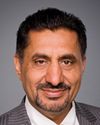I'll give you an example. About two years ago, the Canadian Olympic Committee had roughly 4,000 followers on Twitter. We're approaching 40,000 followers today. I would say that it's moving in a positive direction.
Yes, with our social media platforms, whether it's our website, www.olympic.ca, our Facebook page, or our Twitter account, we try not only to have one-way communication with fans but also to engage and interact with them and to tell our athletes' stories, to talk about our athletes' performances, whether they be at world championships or the Olympic Games.
Our athletes are obviously very much engaged in social media. They themselves quite often interact with their fans.
The key thing is to connect with fans on the platforms they use. Some people connect with athletes by going to local town halls or to local meetings. That's why over the last 12 months we've had more than 1,000 Olympians re-engage into communities across the country with more than 140 events.
What we try to do is provide all the support to the athletes across all platforms, whether it's social media or communities across the country, whether it's in Santa Claus parades or St. Patrick's Day parades.
As well, just to go back to a couple of questions that were asked, for the first time ever this year, for the first time ever in Canadian Olympic Committee history, our athletes participated in pride parades across the country before it even became an issue.





